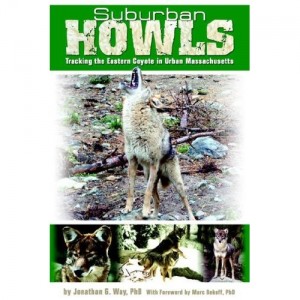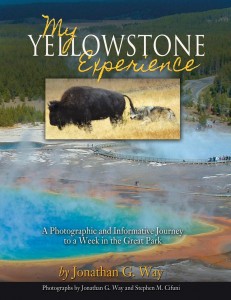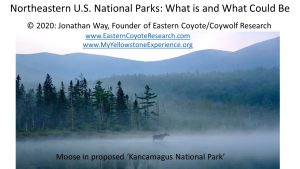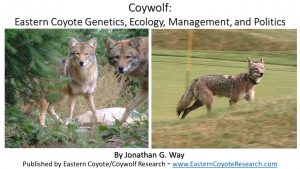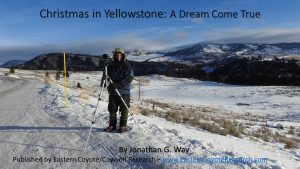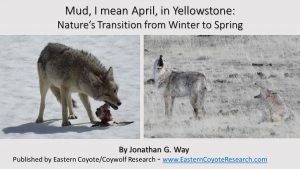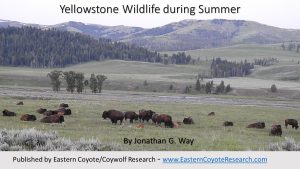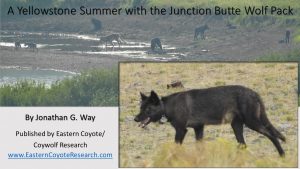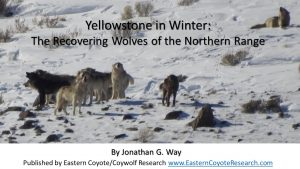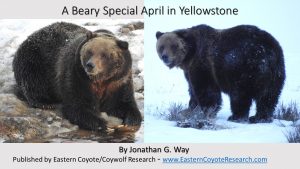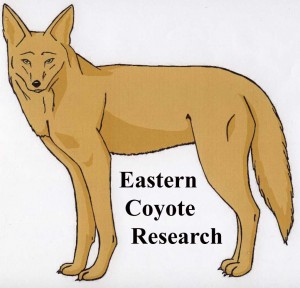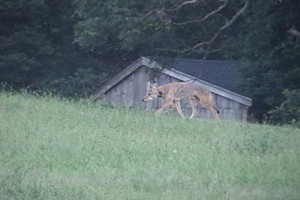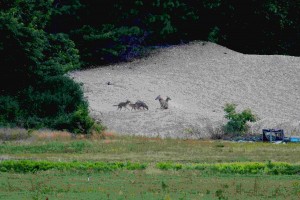August 8, 2013. Revolutionary idea: managing cougars in WA using social stability as a benchmark to management. Hopefully one day all states will practice this for all carnivores. This is great news for more progressive wildlife management where WA is not allowing more than 14% of the lion population in a given area to be killed each year.
Contents:
1. Introduction with quotes and related stories
2. Management recommendations
3. National Canid Protection Act (bottom of page)
Radio-collared adult “Sill” traveling and same adult (Sill) with 5 pups.
See stories on his sociality in a scientific journal or popular acccount (my book).
Introduction (with quotes)
Coyotes and Coywolves are social, family-oriented animals much like wolves are. However, they have been very successful because they can breed at a young age (especially western coyotes), use smaller areas than larger carnivores, and have high reproductive rates. Mostly for that reason, and the occasional legitimate trouble that they cause, the majority of states sadly allow unlimited killing of them (often referred to as pests).
However, Eastern Coyote/Coywolf Research has a different vision. ECR has hope that people will read Suburban Howls and will come to value living with these carnivores, even in their backyards. ECR has hope that the coyote’s and coywolf’s social, family-oriented behavior will be seen as important in preserving, and even if they can survive unlimited hunting and trapping, that it is not worth it, considering the pain and suffering many go through during this process.
Interesting, related quotes:
“If wildlife managers want to retain influence in the management and conservation of pumas, they need to be responsive to stakeholder’s values. Otherwise, their management authority could be frustrated.” – from Desert Puma (p. 392) by Ken Logan and Linda Sweanor.
“Hunters and (state wildlife) agency personnel often show limited empathy and openness because of their orientation toward self-enhancing power and achievement and political or other conservatism. Self-enhancing and conservative values have been closely identified with prejudice, unwillingness to engage constructively with unlike others, and a preference for power arrangements that perpetuate inequality.” – from People, Politics, and Cougar Management by David Mattson and Susan Clark, in Cougar Ecology & Conservation (p. 212), Edited by Maurice Hornocker and Sharon Negri.
“Research scientists have an obligation to inform the public. Most often, they are the only ones who have studied certain species or ecosystems to the extent that they have earned the status of “expert”. Scientists need to distill the often complicated information into a format that most people can understand.” – from Desert Puma (p. 391) by Ken Logan and Linda Sweanor.
Related stories:
Wolves and Oil by George Wuerthner. A great article by former hunting guide Wuerthner. It highlights the fact that state fish and game agencies can’t neutrally manage their predators like wolves and coyotes given their bias to hunting interests. It is a conflict of interest. I happen to agree with just about all of the article. Agencies should not manage predators for “maximum sustainable yield” like you might deer and elk. Predators are social, intelligent animals that live in family units and need a broader, ecosystem focus. Other articles by Wuerthner related to this are here and here and here. They are all worth reading!
May 16, 2012. “To Kill a Mockingbird”. George Wuerthner writing about wolf hunting in Montana… I have always said that coyote and wolf slaughters remind me so much of racism and hatred of others. Glad to see that George W. has eloquently described this here.
9 November 2011. Who owns our wildlife? A great article detailing the tremendous over-reach of hunters in managing wildlife, considering they are only 5 percent of the nations’ population. However, many more dollars is contributed to the general economy than hunters’ dollars. I agree with the author, that maybe hunters should only be in charge of game species (deer, ducks, rabbits) and a new game agency created that would be in charge of predators and other non-game. Also, a similar article details this injustice here.
7 October 2011. Biological mechanisms for why killing coyotes/coywolves doesn’t work. This is an important article that I wrote for The Wildlife News. I hope more folks realize the futility of killing coyotes to kill them. They should have more protection nationwide and be treated like a valuable game animal – not a pest (unless they are in the act of causing damage).
17 June 2011. Scientists call North American model of wildlife management flawed. This is an important article in my view. I have long argued that it is undemocratic to have one user group in charge of something. This is effectively the case for hunters and wildlife management. I particularly believe that the management of predators, certainly including coyotes/coywolves is case in point. For example, having a year round season on coyotes ignores their social, family-oriented nature as well as their important role in nature. This article and the associated scientific article takes my ideas further.
Management Recommendations
The following suggestions will make coyote/coywolf management more equitable. ECR urges you to pressure your state fish and game department to adopt these measures. And a colleague and I have also now written a Carnivore Conservation Act for Massachusetts that could be a guiding principal for carnivore management reform.
1. Shorten the hunting season to a month (say January) during the winter rather than long seasons where they can be killed incidentally to hunting other animals. Coyotes/Coywolves should not need to be pressured all year long, unless they are causing damage on private land. At least their pelts are valuable during the winter.
2. Baiting coyotes and coywolves should be illegal. The same was done with bear and bobcat back in 1996 in Massachusetts. Many hunters even do not like the thought of shooting an animal with its head buried in bait. In my opinion, baiting for “recreational” purposes is not sporting and defines what is wrong with coyote hunting. Update January 7, 2012. “House Hunting Coyotes”: I have learned that there are 2 general statute laws in MA that allow people to bait and shoot coyotes from their house as long as they are either over 500 feet from another house or if the nearby residences (within 500 feet) give their permission. This has to be the most unethical, non-sporting practice imaginable. While it is illegal to bait and hunt most species, this takes it to a whole new level. How can this even remotely be called hunting? Can any hunter call this fair chase? Sadly, I am now learning that many people kill coyotes like this and I would subjectively guess that over half of the “coyotes” in MA are killed this way every year – especially by someone who kills large numbers of them. I hope to have more on this soon.
3. Night hunting should be illegal. That is when the animals are “supposed to be active” in order to avoid people. Many hunters who kill a lot of coyotes or coywolves shoot them over bait at night (some from their rural houses). Both practices are not sporting and should be illegal.
4. Establish a bag limit per hunter. If hunters want to kill a coyote and/or coywolf they should have to pay for it just like they do with animals such as bears and cougars. They should have to buy a special tag for $5 or $10 and they should only be allowed 1-2 per state just like they are with most wild animals. The lack of bag limits along with baiting are the two biggest changes that need to be made in managing social, intelligent animals like coyotes and coywolves. Read George Wuerthner’s articles above: simply put, predators shouldn’t be managed for maximum sustained yield like other creatures.
5. Hounding (the use of dogs) should also be illegal. Chasing another predator to exhaustion is an archaic and unnecessary means to kill an animal. This is not humane. Think of Michael Vick in jail for abusing/murdering dogs, and many coyotes are literally torn apart when they are hunted by dogs. See this website for brutal images of what can happen to coyotes when chased with dogs.
6. Make poison illegal. Household rat poisons kill many non-target animals in addition to predators like coyotes. It should be more difficult to obtain things such as d-Con, which is a powerful poison. These poisons cause an animal to bleed to death internally.
7. Ban coyote hunting contests. For example, see this story (from 5 March 2012). In the Northeast probable wolves are getting killed in the process of these events which is very disturbing and unnecessary.
8. Non-lethal alternatives first. The centuries-old law (in many states including MA) that allows anyone to kill a predator near their livestock should be changed to a statute that is more balanced and in keeping with current times. Prevention should be stressed over killing.
9. Uniqueness of coyotes. A final recommendation is a plea to everyone, to you the reader, to recognize the importance of this magnificent predator in a multitude of ecosystems where the coyote ranges, from southern Central America to the northern reaches of North America.
It will be hard to change these entrenched laws and they are repeatedly defended by state wildlife agencies. For an example, see the attached letter defending hunting and killing them in unlimited numbers – all for a minority of sportsmen. I think a ballot initiative and/or state/federal laws changing these awful practices is the only way that change will occur. There are many reasons (click here) why I think that wildlife management is not science-based, even though it is claimed to be. However, and I repeat here: we have crafted a way for compromise with a Carnivore Conservation Act intended for Massachusetts. Please review the act’s contents.
I believe much of coyote and coywolf hunting is based out of hate. This should not be acceptable in today’s society. States and/or the Federal Government should recognize the value of all animals in an ecosystem not just game animals that are hunted for food (like deer and elk). Accordingly, a National (or state) Carnivore Protection Act to better protect these animals similar to the Eagle Protection Act and Marine Mammal Protection Act might be in order.
But, what if state wildife agencies don’t listen to these reasonable requests (above)? Then I would suggest the:
National (or state) Carnivore Protection/Conservation Act
The way that wild canids (foxes, coyotes, coywolves, wolves) are treated nationwide is appalling. Unless they are (or were) listed under the Endangered Species Act like wolves, most states allow very liberal hunting seasons on these social, family-oriented animals. While most wild animals are offered some form of protection from hunting, many states give coyotes and coywolves no reprieve – 365 days a year. And they are not hunted for meat, so unless their fur (despite many forms of ‘faux fur’ now available) is used, they are simply ‘recreational’ targets for hunters. How barbaric is that?
Many who are untrained about coyote or coywolf ecology may have concerns and reservations by the thought that curtailing hunting of these prolific wild canines might result in them overrunning suburban neighborhoods where they aren’t wanted. But research has shown that their prolificacy is partly an involuntary backlash mechanism that kicks in through loss of pack members. It wouldn’t take very long for them to scale back reproduction if persecution ceased and they were left to regulate their own numbers. Mortality rates for wild canids in suburban areas are already high due many causes such as roadway mortality and other dangers.
Given existing laws, very few states seem to recognize the important role that these predators play in a myriad of food chains/webs. It is pretty clear to most biologists that canids contribute directly to the evolution of their prey. Even the most ancient humans (Native Americans) in North America have only been here for about 10,000 years, yet canids and their prey are millions of years old. Obviously, predator and prey have evolved together over millennia and prey has not gone extinct because of their natural interactions with our wild canid friends. Instead, most modern species extinctions can be traced directly to human tampering.
A federal judge recently reversed the Bush Administration’s 2008 decision to take the wolf in the northern Rockies off the Endangered Species List because the states of Wyoming (especially), Idaho, and Montana, wanted to immediately cull the population of these magnificent predators by more than half. Sadly, they nearly accomplished that in the first two months of their being removed from the protection of the Endangered Species Act in spring 2008, when over 100 wolves were swiftly killed. That is unbelievable when you consider the years and public money spent on the wolf recovery effort only to have the beneficial results reversed in 60 days without regard to the enormous financial investment of taxpayer dollars or the implications of the wolf’s ecological importance.
Coyotes and coywolves are rarely a danger to people, yet they are also slaughtered in staggering numbers. There are very simple ways to coexist with these animals − see the on-line article How To Live With Coyotes (Coy-Wolves) in the Suburbs by Marie Thomas. In the grand scheme of things, these animals – even the ones living in urban areas – provide such a minor risk compared to other risks in our everyday activities they do not even qualify as a danger.
To better reflect the endemic and ecological importance of these predators, I hereby recommend that Congress author the ‘National Canid/Carnivore Conservtion or Protection Act’ (similar to the Marine Mammal Protection Act or Raptor Protection Act). Because Congress takes a while to enact new laws, it is possible that individual states (through Environmental and/or Humane Groups) may choose to enact similar language in their own state statutes. Anything would be an upgrade from the present levels of carnage currently allowed. And a colleague and I have co-written just that guide, as we have written a Carnivore Conservation Act for Massachusetts.
We owe something to these creatures since man’s best friend, the domestic dog, evolved directly from gray wolves. In fact, domestic dogs are genetically virtually identical to gray wolves. Thus, we literally live with wolves and we know that these animals are social, family-oriented animals.
There are currently animal cruelty laws for harming domestic dogs (think of NFL-star Michael Vick going to jail for nearly two years for his dog-fighting ring) yet the same person can buy a moderately priced hunting license enabling them to kill as many coywolves as they want over significant periods of time. That is unacceptable and shameful in today’s society, as well as undemocratic, since the vast majority of people don’t hunt and would prefer to coexist with these animals.
Most people who hunt do not specifically target wild canids, instead preferring meat on the table such as rabbit, grouse, or deer, which most people do not object to being hunted with fair chase laws. Interestingly though, hawks, eagles, and owls are protected by legislation for their important roles in the ecosystem of being scavengers and hunters of small mammals. The unfairness that targets canids who have a possibly more dynamic and important ecological niche is quite illogical.
The National (or state) Carnivore Protection Act would function like the Migratory Bird Treaty Act, where the random shooting of these species would be illegal, especially on our public lands. It is important that Congress initiate this important act so carnivores may live and function the way they were intended to. And wolves should never again be permitted to be gunned down immediately upon being taken off of the Endangered Species List.
Americans increasingly value their wildlife and their place in the environment, and a National Carnivore Protection Act would best reflect our growing understanding and acceptance of the place of all species – including those seen to be competing with humans in some ways – in a myriad of ecosystems.
